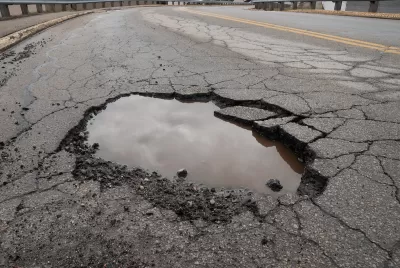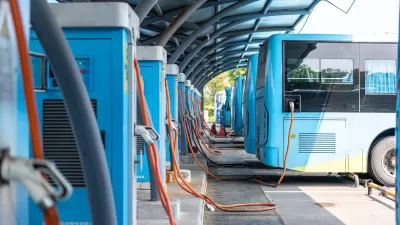Commuters in Massachusetts communities with worse roads use more gas, with the costs disproportionately impacting low-income households.

New research from the University of Massachusetts Amherst reveals that ‘environmental justice communities,’ defined by the state of Massachusetts as areas with low incomes and high percentages of minority groups, have poorer road quality, causing residents to use more fuel for their vehicles.
According to the study’s lead author Egemen Okte, “You need roads to go from point A to point B, and depending on what kind of road you live around, it will change your fuel consumption.”
“As for how this impacted fuel use, nearly all Massachusetts drivers use more than 3% excess fuel (compared to driving on perfect road conditions), and most drivers use 5 to 7% excess fuel, regardless of community status.” In EJ communities, 16 percent of commuters fell in the highest tier of excess gas use, “twice the rate of non-EJ commuters.”
FULL STORY: Disadvantaged Communities in Massachusetts Twice as Likely to Have Poor Roads—and Pay the Cost in Gas

Planetizen Federal Action Tracker
A weekly monitor of how Trump’s orders and actions are impacting planners and planning in America.

Maui's Vacation Rental Debate Turns Ugly
Verbal attacks, misinformation campaigns and fistfights plague a high-stakes debate to convert thousands of vacation rentals into long-term housing.

San Francisco Suspends Traffic Calming Amidst Record Deaths
Citing “a challenging fiscal landscape,” the city will cease the program on the heels of 42 traffic deaths, including 24 pedestrians.

Defunct Pittsburgh Power Plant to Become Residential Tower
A decommissioned steam heat plant will be redeveloped into almost 100 affordable housing units.

Trump Prompts Restructuring of Transportation Research Board in “Unprecedented Overreach”
The TRB has eliminated more than half of its committees including those focused on climate, equity, and cities.

Amtrak Rolls Out New Orleans to Alabama “Mardi Gras” Train
The new service will operate morning and evening departures between Mobile and New Orleans.
Urban Design for Planners 1: Software Tools
This six-course series explores essential urban design concepts using open source software and equips planners with the tools they need to participate fully in the urban design process.
Planning for Universal Design
Learn the tools for implementing Universal Design in planning regulations.
Heyer Gruel & Associates PA
JM Goldson LLC
Custer County Colorado
City of Camden Redevelopment Agency
City of Astoria
Transportation Research & Education Center (TREC) at Portland State University
Jefferson Parish Government
Camden Redevelopment Agency
City of Claremont





























